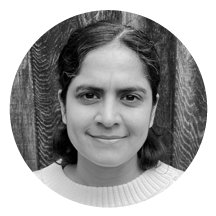Find our Sentientist Conversation on the Sentientism YouTube here or on the Sentientism podcast here.
Nandita is the ED of Population Balance which works to address the impacts of human overpopulation & overconsumption on the planet, people & animals. She is the co-director of the Fair Start Movement, which works on legal & educational reform towards a sustainable & just family-planning model. As faculty with the Institute for Humane Education, Nandita teaches a course “Pronatalism & Overpopulation” about the pervasive pressure on women to have children & the impacts on them, families, non-human animals & the planet. Previously, Nandita worked as a high school physics & math teacher & an administrator in both the public & independent school systems as well as an engineer at Bombardier Aerospace. She has a B.Eng. (Aerospace Engineering) from Ryerson University, a B.Ed. from University of Toronto & an M.Ed. (Humane Ed.) from Antioch University.
In Sentientist Conversations we talk about the two most important questions: “what’s real?” & “what matters?”
Sentientism is “evidence, reason & compassion for all sentient beings.” The audio is on our Podcast here on Apple & here on all the other platforms.
We discuss:
00:00 Welcome
01:10 Nandita’s Intro
- Engineering to teaching maths/physics to studying & teaching at the Institute of Humane Education (animals, humans, environment)
- Pronatalism: The pressure to have children
- Population stabilisation
04:26 What’s Real?
- Growing up in a fairly liberal household in North-West India
- Moving every 3 years. “Wired to desire change”
- Following Hindu religious holidays & traditions
- Transactional religious compliance: fear-based & conditional
- Tribalism & superstition “It didn’t make a lot of sense to me”
- Moving to Canada
- Becoming non-religious was fairly straight-forward
- Dabbling in self-discovery & studying psychology: Realising “These pieces of my identity were for the most part socially constructed”
- De-constructing values & beliefs “Who I was made to believe I was was very limited & finite & self-serving.” Reputation, wealth, success, family
- “What motivates me deeply?” rather than “what do people expect of me?”
- Exploring eastern & western philosophy
- “There is this deep reverence that I hold – not for a god… but for the entire evolutionary process” “There seems to some kind of a kind of miraculousness to it”
- Interconnectedness, scale, deep time, human humility
- “There is something much bigger going on.” Mystery – driven by science – but not limited to evidence, because there may be things we’ll never have evidence of
- Evidence might be limited but that’s not an excuse for “making stuff up”
- How supernatural beliefs can warp compassionate ethics
22:18 What & Who Matters?
- “I found so many loopholes in the religious worldview” “I didn’t feel like leaving left a gap – it was the opposite” Finding a sense of wholeness, wonder & “being OK with not knowing”
- Challenging norms of human supremacy & speciesism & hierarchy & arbitrariness
- Always questioning, but having a working hypothesis so we can decide & act
- Reverence for the process, the planet & all the beings on it
- Care ethics “My purpose is to protect”
- Anthro/sentio/bio/ecocentrism/holism
- The moral difference between cutting a carrot & cutting a pig
- Ecocentrists who exclude sentients!?!
- Revering a system while ignoring the suffering of the beings within it
- Cognitive dissonance
- The violence of animal farming isn’t consistent with reverence or ecocentrism
- Breaking from conservative family expectations & tradition: marriage, kids, wealth
45:12 A Better Future
- “Norms get in the way of us figuring out for ourselves who we are”
- Pronatalism. The centrality of having children
- The implication that women’s only value is in having children & that not doing so is failure
- The responsibility & seriousness of creating new beings
- The risks of over-population (8bn humans but also 100 bn farmed land animals) & over-consumption
- Compassionate population growth mitigation through empowerment, development, education, reproductive rights for girls & women (Costa Rica, Thailand)
- The history & risks of ecofascism/compulsion/immorality re: pop reduction (e.g. 1 child policy, forced sterilisation, war, poverty, disease, famine)
- Ethno-nationalist & religious & economics pronatalism
- Systemic & individual change
- Human & farmed animals as “resources”
- “There’s not a huge difference between how we treat farmed animals & how we treat people”
- Can democracy scale?
Sentientism is “Evidence, reason & compassion for all sentient beings.” More at Sentientism.info.
Join our “I’m a Sentientist” wall using this simple form.
Everyone, Sentientist or not, is welcome in our groups. The biggest so far is here on Facebook.
Thanks Graham for the post-production.

